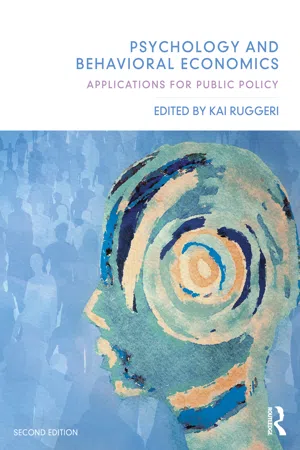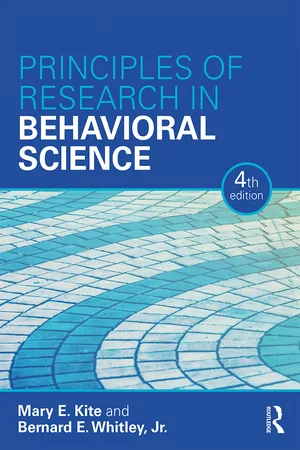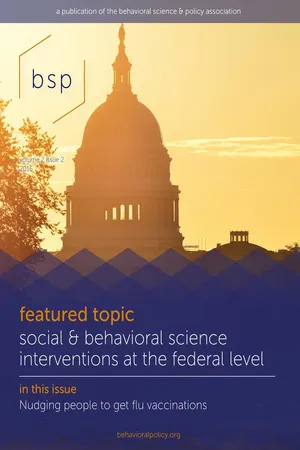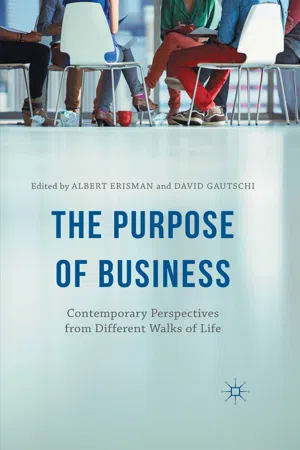Business
Behavioral Science
Behavioral science is the study of human behavior and the factors that influence it, such as social, cognitive, and emotional processes. In a business context, it involves understanding how individuals and groups make decisions, interact, and respond to various stimuli. By applying behavioral science principles, businesses can improve employee motivation, customer satisfaction, and overall organizational effectiveness.
Written by Perlego with AI-assistance
Related key terms
1 of 5
8 Key excerpts on "Behavioral Science"
- eBook - ePub
Psychology and Behavioral Economics
Applications for Public Policy
- Kai Ruggeri(Author)
- 2021(Publication Date)
- Routledge(Publisher)
2A brief history of behavioral and decision sciencesKai Ruggeri, Jana B. Berkessel, Philipe M. Bujold, Maja Friedemann, Hannes Jarke, Kamilla Knutsen Steinnes, Mary MacLennan, Sahana K. Quail, Felice L. Tavera, Sanne Verra, Faisal Naru, Filippo Cavassini, and Elizabeth HardyDOI: 10.4324/9781003181873-2Chapter summary
Behavioral economics has a lot to contribute to effective policies and other applications. As evidence in this area accumulates, the field will increasingly provide direct insights for applications that maximize policy outcomes, particularly to those with a direct relationship to human choices and behaviors. To realize this potential, it is necessary to understand the psychological theory and the mechanisms currently used to study behavior, as well as the historic development of the field. While much was traditionally understood through the lens of classical economics, recent trends have expanded to include findings from psychology, neuroscience, and sociology, to name a few, leading to the areas of scientific study commonly referred to as Behavioral Science and behavioral economics. Findings from these domains are typically known as behavioral insights. They are often characterized by the use of behavioral constructs to explain patterns in the behavior of groups or single individuals. Many influential individuals from these domains have propelled our knowledge of the field, exploring the idiosyncratic ways in which behavior and decision-making affect our daily lives. This chapter provides a brief history of how this field came to be so academically influential while outlining the work of leading figures and concepts necessary to understand, study, and implement these behavioral insights. - eBook - PDF
Principles of Research in Behavioral Science
Fourth Edition
- Bernard E. Whitley, Jr., Mary E. Kite(Authors)
- 2018(Publication Date)
- Routledge(Publisher)
As the title of this book indicates, we will explore the re- search aspect of Behavioral Science in detail. But before doing so, we will put research into context by reviewing the nature of science and theory and by examining how research, theory, and application interrelate. Science Science is a systematic process for generating knowledge about the world. Science has three important aspects: goals to be achieved, key values to be enacted, and perspectives on the best way to go about generating knowledge. We begin by reviewing each of these aspects. Goals of Science Behavioral Science has four goals: the description, understanding, prediction, and control of behavior. Description. As a goal of science, description has four purposes. The first is to define the phenomena to be studied. If you were interested in studying memory, for example, you would need to start by defining memory and by describing what you mean by that Behavioral Science 5 term. Do you mean the ability to pick out something previously learned from a list, as in a multiple-choice test, or the ability to recall something with minimal prompting, as in a short-answer test? Or are you interested in retrospective memories, such as the experiences adults recall from their childhood? It is important to hone in on your definition because your research question and your approach to answering that question are linked to the type of memory that interests you. Thus, the second important purpose of description is clearly differentiating among closely related phenomena; by doing so, you can be certain you are studying exactly what you want to study. Environmental psychologists, for ex- ample, distinguish between population density, the number of people per square meter of space, and crowding, an unpleasant psychological state that can result from high pop- ulation density (Stokols, 1972). High population density does not always lead to feelings of crowding. - eBook - ePub
Perspectives On Behavioral Science
The Colorado Lectures
- Richard Jessor(Author)
- 2019(Publication Date)
- Routledge(Publisher)
Indeed, it was the establishment of that center by the Ford Foundation, and the concurrent initiation of its Behavioral Sciences Program in the early 1950s, that first gave prominence to the term "Behavioral Sciences" and assured not only its currency but also its endurance. Berelson (1968) traces those early developments and argues that the Behavioral Sciences constitute a special subset of the social sciences and can be distinguished from the latter largely by the particular disciplines and subdisciplines that it includes and excludes. He writes, "there seems to have been a genuine need for a collective term in addition to the traditional 'social sciences,' " and there is "a sense of both substantive and technical unity within this segment of the social sciences" (1968:43). Commenting on the very same events, Sutton adds, "the label 'Behavioral Sciences' was chosen because it could clearly embrace psychology and because it was thought to suggest a more firmly scientific approach than 'social sciences' " (1985:59).Berelson's perspective on the Behavioral Sciences as that subset of the social sciences—including psychology—that maintains a rather direct focus on the scientific study of human behavior is a helpful first step toward definition, but it hardly begins to suggest the basis for his extraordinary prophecy: "The new field of the Behavioral Sciences will in all probability be ranked among the important intellectual inventions of the twentieth century" (1968:44). More was obviously intended to be conveyed by the Behavioral Sciences concept, and several other properties of the term were, in fact, elaborated in the staff paper approved by the Ford Foundation's trustees some forty years ago in 1952 (Ford Foundation, 1953). They include, most importantly for our present purposes, allusion to "an interdisciplinary approach and not to any single conventional field of knowledge or a single combination of them"; a concern for "knowledge which promises . . . to serve human needs. The program is thus oriented to social problems . . . "; and the inclusion, under the term 'behavior,' of "such subjective behavior as attitudes, beliefs, expectations, motivations and aspirations" (cited in Berelson, 1968:42).Those three properties attached to the Behavioral Sciences notion—an interdisciplinary approach, an orientation toward social problems, and the incorporation of subjectivity, at least in the limited way then expressed—anticipate some of the key thematic threads that wind through the chapters in this book. That they should have been signaled so explicitly in that "founding" document gives it a definite aura of prescience. Their elaboration in the staff" paper makes clear that the Behavioral Sciences notion was, indeed, intended to connote a great deal more than the mere segregation of a subset of social science disciplines with common substance and technique. - eBook - ePub
Behavioral Cybersecurity
Applications of Personality Psychology and Computer Science
- Wayne Patterson, Cynthia E. Winston-Proctor(Authors)
- 2019(Publication Date)
- CRC Press(Publisher)
2 Essentials of Behavioral ScienceUnderstanding human behavior is integral to the study of cybersecurity. Without a human actor, virtually all cybersecurity issues would be nonexistent. Within computer science and engineering, human-factor psychology is the most common psychological subfield used to solve problems. Human-factor psychology is a scientific discipline that studies how people interact with machines and technology to guide the design of products, systems, and devices that are used every day, most often focusing on performance and safety (Bannon, 1991; Bannon and Bodker, 1991; Salvendy, 2012). Sometimes human-factor psychology is referred to as ergonomics or human engineering. We extend this human-factor psychology focus to include Behavioral Science generally and personality psychology more specifically to develop theoretical and methodological formulations to solve cybersecurity problems. Personality psychology offers a theoretical and methodological approach that is complementary to human-factor psychology as an integral element of cybersecurity. The purpose of this chapter is to describe dimensions of human personality to advance the argument that a personality analytic approach to behavioral cybersecurity that centers on understanding the attacker’s personality can inform defender decision-making in developing a defense strategy. Personality psychology provides a robust theoretical framework for describing differences in individual behavior, while also offering an integrative conceptual framework for understanding the whole person.2.1What Is Behavioral Science?Within the context of the history of psychology, Behavioral Science is a relatively new way to characterize the field of psychology that does so by characterizing itself as the organized study of human and animal behavior through controlled systematic structure (Adhikari, 2016). The American Psychological Association (APA) characterizes the field of psychology as a “diverse discipline,” but with nearly boundless applications to everyday life. In part, the field’s diversity is because it includes several subdisciplines (e.g., developmental psychology, social psychology, organizational psychology, personality psychology, educational psychology, clinical psychology) and over time it has also situated itself as both a natural science and social science. This positioning of the field at the nexus of both natural and social science is in part due to the history of the field of psychology. - eBook - PDF
Decisions, Values and Groups
Reports from the First Interdisciplinary Conference in the Behavioral Science Division Held at the University of New Mexico
- Dorthy Willner(Author)
- 2013(Publication Date)
- Pergamon(Publisher)
Introduction IN recent years there have been persistent attempts, especially in the United States, to unify many different disciplines into a body of knowledge hopefully christened Behavioral Science. Much effort has gone into interdisciplinary research, by which is understood either research carried out cooperatively by individuals who belong in different university departments, or, research in which methods characteristic of different specialties mix. Some of these mixed approaches have been long established. It is common-place, for example, for an experimental psychologist to use statistical tools as a matter of course in evaluating his results. These tools have penetrated wherever clear-cut experimental results (such as the physicist and even the biologist is used to dealing with) are of necessity beclouded by extraneous factors difficult to control. There have also been hopeful applications of mathematical, as distinguished from statistical, methods to many aspects of behavior. Here the theoretician starts with some presumably plausible assumptions quantitatively stated and tries to derive by mathematical deduction relations among variables, which can be translated by appropriate correspondence rules into statements about observable measures or indices. Whatever the success of these methods, a merging of mathematical and statistical techniques with the empirical method in the study of behavior is now an accomplished fact. With regard to the unification of content areas as, for example, in the application of psychiatric concepts to sociology or anthropology, the inclusion of sociological concepts in traditionally psychological research situations, attempts to view overt behavior in neuro-physiological terms, etc., the procedures have been nowhere clearly established, certainly not routinized, and the fruits of these unions are still to come. However, one definite and, I believe, wholesome result of breaking down interdisciplinary barriers can be shown. - No longer available |Learn more
- Craig Fox, Sim B. Sitkin(Authors)
- 2017(Publication Date)
- Brookings Institution Press(Publisher)
Thus, although greater attention has been given in recent years to the use of Behavioral Science in developing policy, in many ways, injecting the current understanding of human behavior into policy is old hat. Over the past several decades, behavioral scientists have developed a framework for understanding human behavior as it relates to the economy, with an emphasis on the various mental shortcuts that individuals take in actual economic decisionmaking. 1 Policymakers have examined these behavioral insights to better explain why the overall economy might not function as expected under standard economic theory. For example, the finding that setting defaults was a powerful way to overcome the often myopic or shortsighted decisions that individuals make with regard to saving for retire-ment helped motivate legislation like the Pension Protection Act of 2006, signed into law by Pres-ident George W. Bush, which made it easier for companies to adopt automatic enrollment as a feature of their retirement plans. 2 Furthermore, insights from Behavioral Science literature can help inform assessments of the costs and benefits of policies that are not themselves explicitly behavioral. In setting fuel economy standards—a policy mandate rather than an attempt to assign a default or shape behavior—policymakers should take into account the extent to which consumers, when purchasing a vehicle, are affected by the framing of information or the weighing of present costs that are certain against future benefits that are uncertain. 3 Starting With Behavioral Tools & Looking for Problems To date, most of the integration of Behavioral Science into public policy has proceeded from developing a set of tools to then searching for problems these tools can help solve. - eBook - PDF
The Purpose of Business
Contemporary Perspectives from Different Walks of Life
- Albert Erisman, David Gautschi, Albert Erisman, David Gautschi(Authors)
- 2015(Publication Date)
- Palgrave Macmillan(Publisher)
All of these situations feature psychological pitfalls that can lead, and indeed have led, people to make poor decisions. Nevertheless, behavioral economics offers suggestions for overcoming pitfalls and making better decisions in these situations. There is huge potential for behavioral economics in business education. At the very least, it is important to teach business students behavioral fundamen- tals, so that they might appreciate their own tendencies and the tendencies of others around them. Even better is to teach students nudging techniques, which involve small modifications to the choice environment to encourage people to make better decisions on their own, with little additional effort required. The biggest challenge is to teach students how to apply behavioral techniques to build organizations with strong decision cultures. This is an initiative in its infancy, involving more than simple nudges, but one which I would like to think offers great promise. Notes 1. See Brain Rules by John Medina (2008) for a general survey of the main insights neuroscience offers about the way people think. 2. In September 2014, BP was found grossly negligent, and the trial to determine damage calculation began in January 2015. Behavioral Economics and Business ● 223 3. http://www.fordham.edu/discover_fordham/mission_26603.asp 4. http://www.scu.edu/jesuit/University-Mission.cfm 5. I worked with Chase during the development and launch of Blueprint (Shefrin and Nicols, 2014). 6. See Medina (2008) for a discussion of differences between brain structure in women and men. 7. See the web site at the Center for Disease Control (CDC) at http://www.cdc.gov/ cdctv/ObesityEpidemic/. 8. This is a per capita figure. 9. See National Center for Health Statistics Data Brief No. 82, January 2012. Obe- sity is defined in terms of body mass index (BMI), which is calculated as weight in kilograms divided by height in meters squared, rounded to one decimal place. - eBook - ePub
Research in Service to Society
The First Fifty Years of the Institute for Research in Social Science at the University of North Carolina
- Guy B. Johnson, Guion Griffis Johnson(Authors)
- 2018(Publication Date)
- The University of North Carolina Press(Publisher)
CHAPTER 9 : Behavioral Science ResearchIn the late 1940s projects in the Institute for Research in Social Science began to extend beyond southern studies and social problems to the area of the Behavioral Sciences. As defined by the committee appointed to survey the scope of Behavioral Science in the University of North Carolina in 1953–54, Behavioral Science included “as many areas as scientists can usefully investigate” by “application of methods of science to problems of human behavior.”1 By the time the survey was made, the senior staff at the Institute had been increased by the arrival of a group of young scientists whose training had been influenced by social theories and methodology growing out of the rapidly developing technology of the late 1930s and World War II.The Beginnings of Behavioral Science Research
Gordon W. Blackwell, the Institute’s director, who had obtained his doctorate in sociology from Harvard, had met there another graduate student in sociology, Nicholas J. Demerath, who joined him in Chapel Hill. Other additions to the faculty in the Department of Sociology were Reuben Hill of Iowa State College, who had a doctorate from the University of Wisconsin and excellent credentials in the changing methodological approach to research on marriage and the family; E. William Noland of the University of Iowa, who had a doctorate in sociology from Cornell University and whose research specialization was in human relations in industry; and Harvey L. Smith, who had a doctorate from the University of Chicago and whose research interests lay in the social aspects of health and medical care.John W. Thibaut, the social psychologist whom Blackwell had brought to the Institute and to the Department of Psychology in 1953, had a special research interest in the psychology of small groups. Dorothy C. Adkins, a psychometrician, had become chairman of the Department of Psychology and had been largely responsible, with some help from Institute funds, for bringing to the University L. L. Thurstone and his wife, Thelma, after their retirement from the University of Chicago.2
Index pages curate the most relevant extracts from our library of academic textbooks. They’ve been created using an in-house natural language model (NLM), each adding context and meaning to key research topics.







